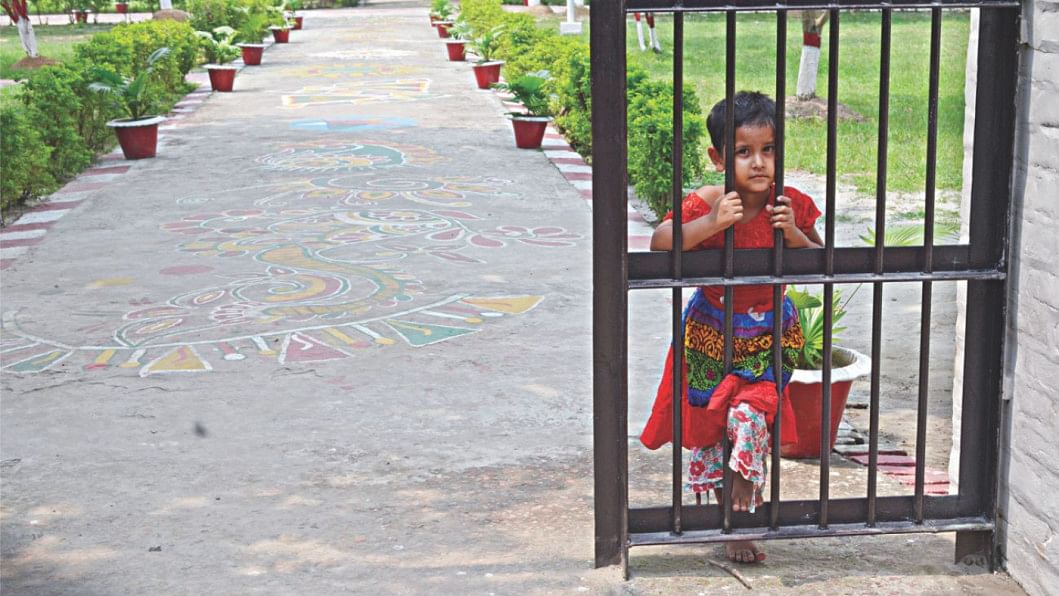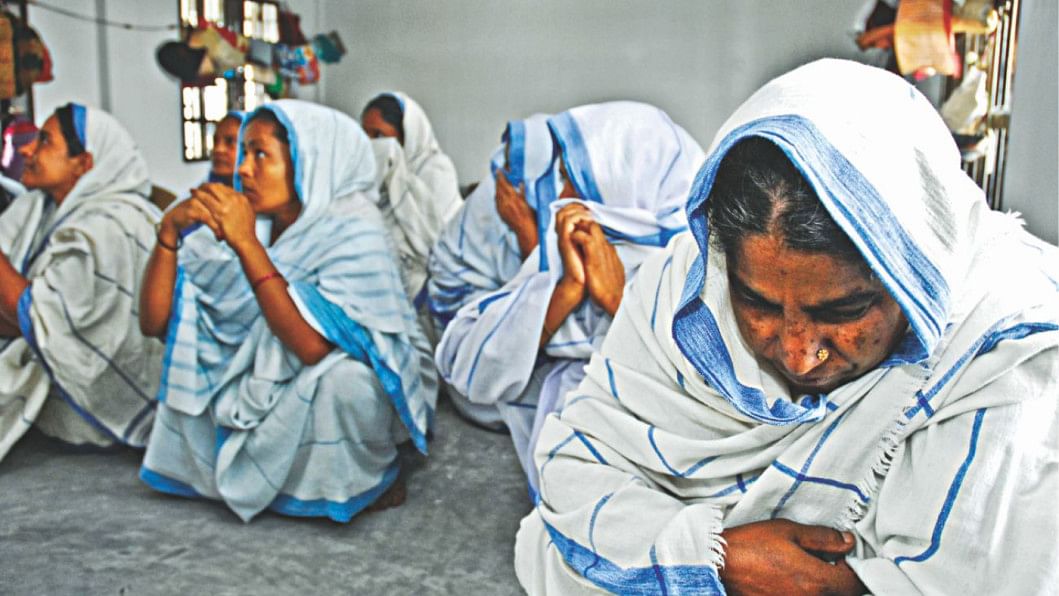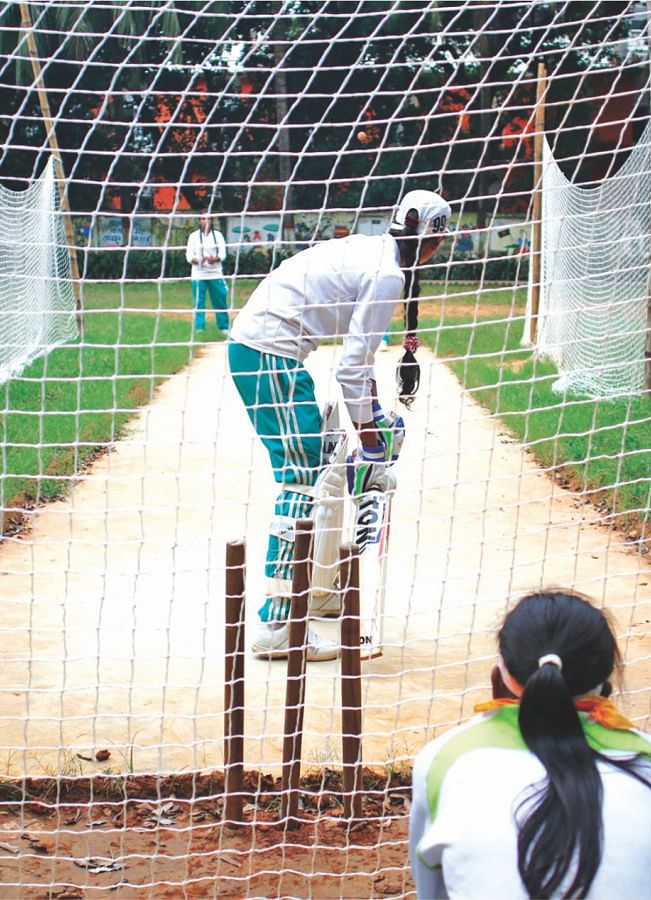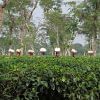Prison babies: childhood behind bars
Remember the rape and murder of 15-year-old Shazneen Tasnim Rahman that dominated public attention in 1998?
For an unborn foetus, the incident defined her life. Among the six accused and initially sent to death row were domestic helpers Estema Khatun Minu and her sister Parvin. When sent to jail, one was carrying a child.
Today, that child is a 10th grader living in an orphanage not too far from the place where Shazneen used to live.
"I was born in the prison. My mother used to be a death-row convict," says the girl, "I lived in lock-up with her until I was six." After that she was separated from her mother and sent to a government shelter. The highschooler has told nobody outside of the orphanage who her mother really is, so to protect her identity, Star Weekend is concealing her real name, calling her Noyon instead.
She is one of hundreds living within the social welfare system because their mothers are incarcerated. According to Suraiya Akter, Assistant Inspector General of Prisons overseeing the Department of Law, the number of children in jail, at the beginning of October, is 289. This time last year, the number was 365 for about 2,800 female prisoners.
These children join their mothers if they are too young to live separately, or if there are no family members to take care of them outside. The children spend the first six years of their life within the prison walls, and then leave to stay with relatives, or end up in a government shelter.
What is it like spending the formative early years in one of the most overcrowded prison systems in the world? What protections are there in place to ensure they develop like any other child?

Life inside
"My nicest memories from my time in jail are of the day-care centre," says Noyon. It was probably her only respite from the round-the-clock lock-up that death-row convicts are subject to. Her mother was sentenced to capital punishment in September 2003—the year Noyon too started living on the death row. The Dhaka Central Jail inaugurated its first day-care centre the following year.
There are running day-care centres in 10 jails, according to Tarikul Islam, a Programme Officer with Bangladesh Shishu Academy that runs schools inside the prison.
"Shishu Academy started providing pre-primary schooling in prisons in 2009. We began with the former Dhaka Central Jail and then moved on to others," he says. Students are following the national curriculum. The jails include the former Dhaka Central Jail, and the prisons in Kashimpur, Rangpur, Rajshahi, Chittagong, Mymensingh, Jessore, Comilla, Sylhet and Barisal. The programme has reached around 900 children so far, according to him.
"This programme was necessary because having a day-care centre is not the same as having a classroom. A teacher comes in every weekday to teach for two-and-a-half hours. When they move out of the prisons, they can seamlessly transition into primary school," adds Islam. All educational supplies are funded by the Ministry of Women and Children Affairs.
Did the children not get any education before the project? Jharna Zahin, a former high-ranking Social Welfare Officer in Dhaka Central Jail, answers the question: "There were two officers in charge of teaching the children but I never saw them come to work during my time there."
What is life like for the children inside the prison? "The children are brought to the day-care centre early morning. They go back to their cells around 4 pm, to spend the rest of the day in lock-up," she says.
Lock-up entails hours on end inside an intensely overcrowded cell. Bangladesh ranks third in terms of overcrowding in prisons in Asia, as per the Prisons Directorate itself. Jails where the children are kept, have two-and-a-half times their capacity, on average. The worst is Gazipur Jail—in 2016, it held five times its capacity.
"The prison has everything a person may need—gardens, a library, a shop. The children just need to be inside the prison walls," adds Zahin.
So they never get out? "One time I made a special request to take the children to Shishu Park and we had a lot of fun that day," she remembers. In conclusion, there is no systemic provision for these children to have exposure to the outside world. For as long as they are there, the prison walls are all they see.
This year Shishu Academy held an art competition for children in jail with their mothers. Tarikul Islam remembers how four-year-old Shanto, who has been in Kashimpur Jail since birth, reacted when brought to the city for the prize-giving ceremony. "Shanto bagged the third prize, so coming to the city was a completely new experience for him. He was even interviewed by a television channel," describes Tarikul, his voice twinkling with pride.
He sent over a scan of Shanto's award-winning artwork. It featured a flag and a red sun on a white background. The neat colouring-in could not hide the fact that Shanto drew two of the only things he saw every day—the flag and the sun. The work that won an award out of hundreds had none of the village scenes that children wishfully draw. For Shanto there are no weekends in the museum like city kids, or fishing knee-deep in water like their rural counterparts.
"I agree, there is probably some effect on how the children evolve, although I am not an expert on their cognitive development," says the Director-General of the Department of Social Services, Gazi Mohammed Nurul Kabir, "Weekly excursions should be beneficial." There is however no solid plan in the near future of any such system.

Abuse and violation of rights
Abuse and deprivation in jail is not an unknown issue and these children are not excluded from that. A social welfare officer at Dhaka Central Jail narrated her experiences on conditions of anonymity. Prisons maintain strict privacy, and she did not want to be caught divulging information.
"There were 90 kids inside. On my first day at the day-care I saw less than half of them," she says. "When I asked about the rest, the guards told me that influential prisoners are not letting some of the mothers send their children."
She describes how mothers would be forced to give away the milk and food allotted for their child or sell it for money. "The day-care was right next to the cells. I approached the head office and got those cells assigned only to women with children in the day-care. This was to stop older prisoners from interfering with young mothers," she says.
Prisoners too attested to the abuse their children face. "According to the system, my daughter is supposed to get meat once a day," Brishti, a mother who was in jail until last week, describes, "I was new and did not know how to buy the favour of the older prisoners. The prisoners assigned to serve us food would give my daughter a single chicken neck." Brishti, a 20-year-old from the Karwan Bazar rail-line slum, had just come home after being released, when she was interviewed last week. She had gone behind bars with her two-year-old daughter.
Her neighbour, a heavily pregnant woman identifying as Lata, adds to the narrative. "Once I was in prison with my seven-month-old daughter, and she was served bitter gourd for dinner. How do I make an infant eat bitter gourd?" she says. Lata was let out a month back on bail. When asked whether she received any ante-natal care at prison, she claimed she had not. Were zinc or iron tablets provided? Once again she shook her head.
Both Brishti and Lata chose to use a pseudonym in fear of being persecuted if found talking to a reporter. If disclosed, these women could land in jail again. They live in what is currently the country's largest drug den. Children of this area are more at risk of suffering under the prison system's inadequacies simply because they come in contact with it more frequently.
Lata, for example, has 14 cases pending against her and goes in and out of jail several times a year, whenever the policemen see fit to send her and her children to lock-up for missing payments to them. With 14 cases, it is easy to find a reason, and just this year, she was in prison twice.
Also important to note: many of the mothers being booked are not convicted yet. A policeman can shove a mother and child into jail on an accusation. According to the prison's own statistics, three-fourths of all their inmates are currently under trial. The "detainees" and their children are kept within the same system as hardened criminals.
Detainees being sent straight to prison puts this population at risk of arbitrary arrest—with prison being the "stick" used by the police to keep them in check. Allegations of extortion and fraud flourish as much here as the market for yaba, marijuana and heroin. Brishti and her child were picked up for allegedly dealing marijuana. "A group of policemen knocked on my door at night with a man in tow. I had loaned the man money and he bought four bundles of weed with it," she describes. "When a policeman caught him, he said I was the source."
They allegedly threatened to book her under a heroin case—which has much harsher sentences—unless she paid up. "I paid BDT 15,000 and they booked me in for dealing marijuana," she adds. Brishti was sent to jail as a "detainee", where she—and her baby—were housed with convicted criminals. She insists the charges are false.
Lata's children are doomed to a future going in and out of prison—their mother cannot stop dealing.
"I started dealing when my husband left me with two daughters and married another woman," she says. Since then it has been a vicious cycle that begins with peddling drugs to feed her children, and ends with dealing again because she cannot keep a legal job. "I get picked up by the police so many times, how can I work in a decent place without getting fired?" she asks. What she wants most in life is to start anew with a legal job.
Brishti claims that although she lives smack in the middle of the den, she has no plans to deal. What will test that resolve is the poverty she faces every day. "My husband is unemployed but does not let me work. I paid my bail by selling my wedding jewellery," she says

Life afterwards
When the children turn six, they are separated from their mothers and put into different orphanages. What is life like after that?
Shumi lives with Noyon. A year junior to Noyon in school, Shumi is neither Bengali, nor Bangladeshi. Her mother was crossing the border with a friend who allegedly slipped heroin inside her bag. Shumi too was born in jail but has told nobody other than the orphanage children about it, so is using a pseudonym.
"At first I was upset about leaving, but soon made new friends and forgot it all," she remembers.
Her mother has been out on bail and visits her once a month. Shumi is not allowed to go out with her because her mother is still under trial. "She lives with people I don't know. I don't know what she does to support herself," says Shumi, "One day I want to visit the country my mother came from," she says, adding she is not interested in seeking out her family there. Her mother is not Muslim, but a lifetime in prison has turned Shumi into one, so she wants to stay in Bangladesh. She uses the surname "Akter".
Noyon mentions she went to visit her mother several times in lock-up. "The police came and took me to the jail," she says. Visits are wholly dependent on the individual's understanding with the jail superintendent however.
For example, Zahin, who is now the senior supervisor of a government orphanage that houses such kids, states that jail visits at her home are at a stalemate, "We cannot send the children to Kashimpur without police protection, and the prison authorities refuse to pick them up, breaching years of understanding."
Noyon's mother, however, left for Saudi Arabia without a word one day. She has not heard from her mother since. "She was probably busy," says a wistful Noyon quietly. For a former death-row convict of a high-profile case, getting a job might be easier abroad.
Noyon had visited her mother's family in Gazipur. "They are carpenters. The living conditions are not as good as what we get here in the orphanage, but…" she does not finish the sentence. Noyon is a pro-athlete who plays cricket and her team beat the women's police team last year in a tournament. She dreams of joining the army. She is however not blind to the fact that it was her life in the orphanage that afforded her such opportunities—had she grown up in Gazipur, she might not have had all this. "If I could choose, I'd want both my mother and my current life," muses Noyon.

 For all latest news, follow The Daily Star's Google News channel.
For all latest news, follow The Daily Star's Google News channel. 






Comments